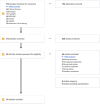Discharge from secondary care services to primary care for adults with serious mental illness: a scoping review
- PMID: 39272006
- PMCID: PMC11396452
- DOI: 10.1186/s12888-024-06067-6
Discharge from secondary care services to primary care for adults with serious mental illness: a scoping review
Abstract
Background: Effective transitions of patients from Secondary Care Services (SCSs) to primary care are necessary for optimization of resources and care. Factors that enable or restrict smooth transitions of individuals with Serious Mental Illness (SMI) to primary care from SCSs have not been comprehensively synthesized.
Methods: A scoping review was conducted to answer the questions (1) "What are the barriers and facilitators to discharge from SCSs to primary care for adults with SMI?" and (2) "What programs have been developed to support these transitions?".
Results: Barriers and facilitators of discharge included patient-, primary care capacity-, and transition Process/Support-related factors. Patient-related barriers and facilitators were most frequently reported. 11 discharge programs were reported across the evidence sources. The most frequently reported program components were the provision of additional mental health supports for the transition and development of care plans with relapse signatures and intervention plans.
Conclusions: Established discharge programs should be comprehensively evaluated to determine their relative benefits. Furthermore, research should be expanded to evaluate barriers and facilitators to discharge and discharge programs in different national contexts and models of care.
Trial registration: The protocol for this scoping review is registered with the Open Science Framework ( https://doi.org/10.17605/OSF.IO/NBTMZ ).
Keywords: General practitioners; Mental health; Mental illness; Psychiatry; Transition.
© 2024. The Author(s).
Conflict of interest statement
The authors declare no competing interests.
Figures


Similar articles
-
Conceptual framework on barriers and facilitators to implementing perinatal mental health care and treatment for women: the MATRIx evidence synthesis.Health Soc Care Deliv Res. 2024 Jan;12(2):1-187. doi: 10.3310/KQFE0107. Health Soc Care Deliv Res. 2024. PMID: 38317290
-
A clustered controlled trial of the implementation and effectiveness of a medical home to improve health care of people with serious mental illness: study protocol.BMC Health Serv Res. 2018 Jun 7;18(1):428. doi: 10.1186/s12913-018-3237-0. BMC Health Serv Res. 2018. PMID: 29880047 Free PMC article. Clinical Trial.
-
Barriers and facilitators to the participation and engagement of primary care in shared-care arrangements with community mental health services for preventive care of people with serious mental illness: a scoping review.BMC Health Serv Res. 2023 Sep 11;23(1):977. doi: 10.1186/s12913-023-09918-2. BMC Health Serv Res. 2023. PMID: 37697280 Free PMC article.
-
Barriers and facilitators to mental health care access and engagement for LGBTQA+ people with psychosis: A scoping review.Psychiatry Res. 2025 Jan;343:116281. doi: 10.1016/j.psychres.2024.116281. Epub 2024 Nov 22. Psychiatry Res. 2025. PMID: 39616980
-
Barriers and facilitators to mental health treatment access and engagement for LGBTQA+ people with psychosis: a scoping review protocol.Syst Rev. 2024 May 30;13(1):143. doi: 10.1186/s13643-024-02566-5. Syst Rev. 2024. PMID: 38816775 Free PMC article.
References
-
- HealthCanada. Canada's Health Care System 2019, Sept 17 Available from: https://www.canada.ca/en/health-canada/services/health-care-system/repor....
-
- NationalInstituteforHealthandCareExcellence. Glossary n.d. https://www.nice.org.uk/Glossary?letter=S.
-
- Crisp N, Smith G, Nicholson K. Old problems, new solutions: Improving acute psychiatric care for adults in England 2016 [ www.caapc.info
Publication types
MeSH terms
LinkOut - more resources
Full Text Sources
Medical

